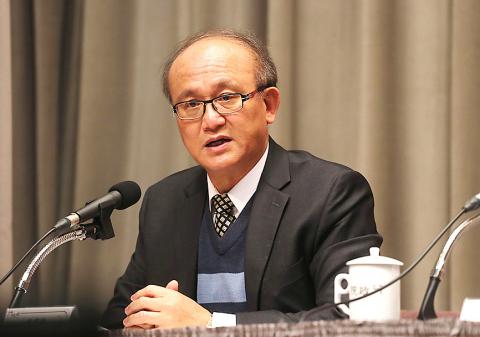National Taiwan University (NTU) president-elect Kuan Chung-ming (管中閔) yesterday said the Ministry of Education must make a decision on his appointment by the end of the month.
Kuan, who was originally scheduled to take office on Feb. 1, has been embroiled in several scandals since word of his selection by the university’s election committee at the beginning of January.
While he was cleared of initial conflict of interest claims during the selection process and plagiarism complaints, he is now being investigated for potential breaches of the Classified National Security Information Protection Act (國家機密保護法).

Photo: CNA
“It has been more than two-and-a-half months since NTU’s presidential election committee on Jan. 5 elected me as president and submitted a request to the ministry for my appointment,” Kuan said in a statement, asking the ministry to make a decision about his appointment by the end of the month.
Government agencies and the media have constantly been creating groundless and false allegations against him and the ministry has been shirking its responsibility, Kuan said.
Kuan’s statement came the same day that Minister of Justice Chiu Tai-san (邱太三) announced that the Taipei District Prosecutors’ Office has opened an investigation into Kuan’s alleged breaches of the act.
Web site newtalk.tw on Friday last week reported that Kuan has taught at several Chinese institutions since 2005, including Xiamen University, Xian Jiaotong University and Huazhong University of Science and Technology.
Local media have speculated that he went to China to teach without requesting approval from the government agencies he headed at the time, a requirement under the act, which stipulates that officials who have handled classified information must obtain approval before departing the nation within three years after retirement or resignation.
Kuan served as a minister without portfolio from 2012 to 2015, Council for Economic Planning and Development minister from 2013 to 2014 and National Development Council minister from 2014 to 2015.
Given that Article 26 of the act allows agencies to shorten the period for which approval must be requested, prosecutors are investigating whether Kuan contravened the act by teaching in China almost immediately after resigning from his National Development Council post.
Questions have also been raised about whether Kuan’s work for Chinese schools contravened other laws and regulations, including the Act Governing the Appointment of Educators (教育人員任用條例), the Act Governing Relations Between the People of the Taiwan Area and the Mainland Area (台灣地區與大陸地區人民關係條例) and the Principles Governing the Handling of Part-time Employment by Full-time Instructors at Public Schools of All Levels (公立各級學校專任教師兼職處理原則).
The ministry is to decide the Kuan issue after evaluating the outcome of the university’s school affairs meeting tomorrow, Deputy Minister of Education Lin Teng-chiao (林騰蛟) said yesterday.
Asked if the ministry plans to form a task force to probe claims that Kuan taught in China, Lin said that as Kuan is a full-time professor at NTU, it was the responsibility of the univerity’s personnel department to deal with the matter.

INVESTIGATION: The case is the latest instance of a DPP figure being implicated in an espionage network accused of allegedly leaking information to Chinese intelligence Democratic Progressive Party (DPP) member Ho Jen-chieh (何仁傑) was detained and held incommunicado yesterday on suspicion of spying for China during his tenure as assistant to then-minister of foreign affairs Joseph Wu (吳釗燮). The Taipei District Prosecutors’ Office said Ho was implicated during its investigation into alleged spying activities by former Presidential Office consultant Wu Shang-yu (吳尚雨). Prosecutors said there is reason to believe Ho breached the National Security Act (國家安全法) by leaking classified Ministry of Foreign Affairs information to Chinese intelligence. Following interrogation, prosecutors petitioned the Taipei District Court to detain Ho, citing concerns over potential collusion or tampering of evidence. The

NEGOTIATIONS: Taiwan has good relations with Washington and the outlook for the negotiations looks promising, Minister of Economic Affairs J.W. Kuo said Taiwan’s GDP growth this year is expected to decrease by 0.43 to 1.61 percentage points due to the effects of US tariffs, National Development Council (NDC) Minister Paul Liu (劉鏡清) said at a meeting of the legislature’s Economics Committee in Taipei yesterday, citing a preliminary estimate by a private research institution. Taiwan’s economy would be significantly affected by the 32 percent “reciprocal” tariffs slapped by the US, which took effect yesterday, Liu said, adding that GDP growth could fall below 3 percent and potentially even dip below 2 percent to 1.53 percent this year. The council has commissioned another institution

TRADE: The premier pledged safeguards on ‘Made in Taiwan’ labeling, anti-dumping measures and stricter export controls to strengthen its position in trade talks Products labeled “made in Taiwan” must be genuinely made in Taiwan, Premier Cho Jung-tai (卓榮泰) said yesterday, vowing to enforce strict safeguards against “origin laundering” and initiate anti-dumping investigations to prevent China dumping its products in Taiwan. Cho made the remarks in a discussion session with representatives from industries in Kaohsiung. In response to the US government’s recent announcement of “reciprocal” tariffs on its trading partners, President William Lai (賴清德) and Cho last week began a series of consultations with industry leaders nationwide to gather feedback and address concerns. Taiwanese and US officials held a videoconference on Friday evening to discuss the

NEGOTIATIONS: The US response to the countermeasures and plans Taiwan presented has been positive, including boosting procurement and investment, the president said Taiwan is included in the first group for trade negotiations with the US, President William Lai (賴清德) said yesterday, as he seeks to shield Taiwanese exporters from a 32 percent tariff. In Washington, US Trade Representative Jamieson Greer said in an interview on Fox News on Thursday that he would speak to his Taiwanese and Israeli counterparts yesterday about tariffs after holding a long discussion with the Vietnamese earlier. US President Donald Trump on Wednesday postponed punishing levies on multiple trade partners, including Taiwan, for three months after trillions of US dollars were wiped off global markets. He has maintained a 10 percent